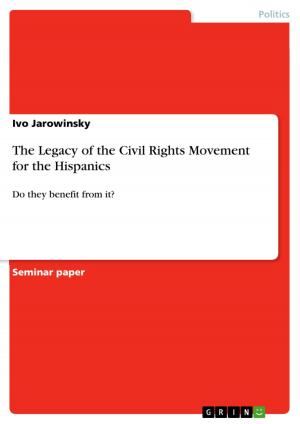A critical investigation of the merits and drawbacks of in-depth interviews
Business & Finance, Industries & Professions, Hospitality, Tourism & Travel| Author: | Manuel Kaar | ISBN: | 9783640455317 |
| Publisher: | GRIN Publishing | Publication: | October 23, 2009 |
| Imprint: | GRIN Publishing | Language: | English |
| Author: | Manuel Kaar |
| ISBN: | 9783640455317 |
| Publisher: | GRIN Publishing |
| Publication: | October 23, 2009 |
| Imprint: | GRIN Publishing |
| Language: | English |
Seminar paper from the year 2007 in the subject Tourism, grade: 1,2, University of applied sciences, course: Tourism and Leisure Studies, language: English, abstract: When commencing to plan a study, researchers face the oftentimes challenging task to decide on the adequate research method for their investigation problem at hand. Since the appropriateness of a study, as well as its ability to be accepted as scientific research, depend very much on the correct choice of the applied research method(s), the decision process for the latter constitutes a crucial phase of the overall research operation. As many researchers encounter ambiguities when it comes to selecting the suitable research technique, this paper provides a critical reflection on several arguments for and against the employment of in-depth interviews, one of the most common tools used in qualitative research. The aim of this paper is, therefore, to consider the strengths and weaknesses of in-depth interviews from various angles, in order to advance the perspicuity of the question in which situations it is apt to use interviews as a research tool and when to better search for alternative methods. To arrive at this objective, four main issues have been explored through a review of already existing literature. First, the merits of individual in-depth interviews are examined. Then the paper addresses the question of what possible drawbacks one may come across when selecting in-depth interviewing as a research method. Furthermore, a short comment on the application of indepth interviews in qualitative tourism research is given. Finally, in the conclusions/recommendations section it is explained for which types of investigations the in-depth interview is the appropriate research technique. As indicated above, the main focus of this paper is not on providing a guide for the general set-up and implication process of an in-depth interview. The main spotlight is rather on the enhancement of the detailed knowledge of researchers on in-depth interviews, with the ultimate goal to make a contribution to increase the number of cases where research methods have been appropriately chosen. Hence, a certain level of previous knowledge about in-depth interviewing is expected from the reader in order to be able to follow the content of this paper.
Seminar paper from the year 2007 in the subject Tourism, grade: 1,2, University of applied sciences, course: Tourism and Leisure Studies, language: English, abstract: When commencing to plan a study, researchers face the oftentimes challenging task to decide on the adequate research method for their investigation problem at hand. Since the appropriateness of a study, as well as its ability to be accepted as scientific research, depend very much on the correct choice of the applied research method(s), the decision process for the latter constitutes a crucial phase of the overall research operation. As many researchers encounter ambiguities when it comes to selecting the suitable research technique, this paper provides a critical reflection on several arguments for and against the employment of in-depth interviews, one of the most common tools used in qualitative research. The aim of this paper is, therefore, to consider the strengths and weaknesses of in-depth interviews from various angles, in order to advance the perspicuity of the question in which situations it is apt to use interviews as a research tool and when to better search for alternative methods. To arrive at this objective, four main issues have been explored through a review of already existing literature. First, the merits of individual in-depth interviews are examined. Then the paper addresses the question of what possible drawbacks one may come across when selecting in-depth interviewing as a research method. Furthermore, a short comment on the application of indepth interviews in qualitative tourism research is given. Finally, in the conclusions/recommendations section it is explained for which types of investigations the in-depth interview is the appropriate research technique. As indicated above, the main focus of this paper is not on providing a guide for the general set-up and implication process of an in-depth interview. The main spotlight is rather on the enhancement of the detailed knowledge of researchers on in-depth interviews, with the ultimate goal to make a contribution to increase the number of cases where research methods have been appropriately chosen. Hence, a certain level of previous knowledge about in-depth interviewing is expected from the reader in order to be able to follow the content of this paper.















